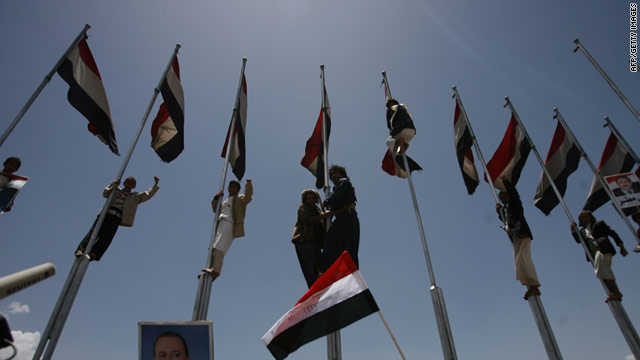April 20, 2011 -- Updated 1624 GMT (0024 HKT)

Supporters of President Ali Abdullah Saleh climb on flag poles during a rally held in the capital Sanaa on April 15, 2011.
STORY HIGHLIGHTS
- NEW: Unrest reported in Taiz, Sanaa and Hodeida
- The U.N. Security Council discusses Yemen
- UNICEF voices concern over children's deaths
The United Nations Security Council met for the first time Tuesday to tackle the hostilities in Yemen, in which anti-government protesters have clashed with security forces and pro-government demonstrators over the last two months.
The U.N. efforts to deal with the Yemen crisis coincide with the ongoing initiative of the six-nation Gulf Cooperation Council, or the GCC -- a coalition of Gulf Arab nations working to ease tensions between Yemen's government of Ali Abdullah Saleh and a restive opposition.
The Security Council was unable to agree on a joint statement, and it's unclear whether any diplomatic reaction will be forthcoming on Yemen in the coming days.

Yemeni women protest Saleh's remarks

Yemen protests intensify
This world and regional diplomatic focus on Yemen comes as protesters took to the streets in the capital of Sanaa and other cities across the country, which the United Nations calls the poorest country in the region.
One death was reported in Hodeida on Wednesday, when security forces in civilian clothing shot and killed a protester, sources said.
Security officials in the Aden province city of Khormaksar said a soldier was killed and three others were wounded. Security forces said they saw at least six local residents armed with machine guns attack security forces.
Eyewitnesses said troops had been antagonizing Khormaksar by setting up checkpoints, questioning people on the streets, and using threatening language.
Thousands of demonstrators took to the streets in Sanaa over the killings of protesters on Tuesday, when at least five people died.
In Taiz, eyewitnesses said four protesters were injured when they attacked government convoys with rocks and gunfire. One of the convoys was from the Taiz governor's office.
Yemen's instability is rooted in grass-roots political and economic grievances, but the country's instability concerns the West. That's because the al Qaeda terror network has a strong presence there. The Saleh government has been a U.S. ally in the fight against Islamic militants there.
At the United Nations, the Security Council was briefed by a senior U.N. political affairs officer and a U.N. envoy to Yemen. Germany and Lebanon introduced a statement on Yemen which would have called for restraint in violence, among other themes.
U.S. Ambassador to the United Nations Susan Rice said the United States and other nations discussed calling for restraint and an end to the violence in Yemen with a credible transition to democracy.
The United States and France wanted to also express support for the efforts of the GCC. Germany voiced concern about the deteriorating situation in Yemen at the meeting and called on all parties to have a dialogue in Yemen. It also expressed support for the GCC.
But one U.N. diplomat said concerns from China and Russia blocked a unified response to the developments, and some countries wanted more time to consult their governments.
Another U.N. agency, the United Nations Children's Fund, said Wednesday that too many children are exposed to danger in Yemen.
UNICEF spokeswoman Marixie Mercado told journalists in Geneva, Switzerland, that at least 26 children have been killed, mainly by live bullets or ammunition over the last two months.
Another 15 children were killed in a large explosion at the Abyan ammunition factory in March "when civilians reportedly looted the facility, which had been previously taken over by militants."
Mercado said more than 80 other children had been injured in beatings, rock-throwings or shootings. She said nearly 800 others had been exposed to tear gas in Yemen.
RELATED TOPICS

No comments:
Post a Comment